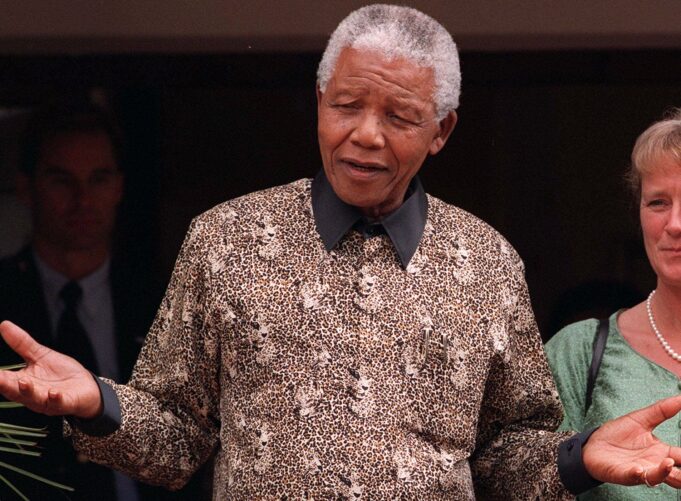What are South Africa’s first Black president and anti-apartheid activist Nelson Mandela’s achievements? December 5 marked 10 years since the freedom fighter died at age 95. A decade after his death, what is the legacy left by the icon who ushered in an era of hope and inspiration to an apartheid-divided country?
In this current geopolitical world of growing global outrage against Zionist Israel and its unrelenting destruction in Gaza, Mandela’s relationship with Palestinian Liberation Organization (PLO) leader, the late Yasser Arafat, is given new meaning, noted several media outlets. Days after his release from 27 years in prison in February 1990, Mandela gave Arafat a bear hug, symbolizing his embrace of a cause his country’s governing ANC party continues to this day to champion.

During a laying of wreaths at a statue of the statesman and Nobel Peace Prize winner, Hamas officials joined members of Mandela’s family to mark the 10th anniversary of his passing.
According to ABC News, former Hamas government minister Basel Naim was in South Africa as a part of a delegation and joined Mandela’s grandson, Mandla Mandela, and others at the ceremony at the Union Buildings in Pretoria, the seat of the South African government.
In one of three meetings with Arafat, including a trip to Gaza addressing the occupied Palestinian issue, with Arafat seated on stage, Mandela said, “Choose peace rather than confrontation, except in cases where we cannot get, where we cannot proceed, where we cannot move forward, then if the only alternative is violence, we will use violence.”
It was a remark as controversial then as South Africa’s support for the Palestinian cause is today, but per usual, Mandela brushed off the criticism. In fact, during a 1990 town hall meeting in New York City hosted by ABC’s Ted Koppel, Mandela, responding to his critics, shot back: “One of the mistakes which some political analysts make is to think that their enemies should be our enemies.”
His remark drew thunderous applause. He added: “Our attitudes towards any country is determined by the attitude of that country to our struggle. Yasser Arafat, Colonel Gadhafi, Fidel Castro support our struggle to the hilt. They do not support in rhetoric. They are placing resources at our disposal for us to wage the struggle. That is the (ANC) position.”
During another exchange, Henry Siegman, executive director of the American Jewish Congress, was asked by Koppel, “Stand for a moment and pose whatever question he would like directly to you.”
Siegman said Mandela’s response displayed “a certain degree of amorality by ignoring human-rights violations in other nations.” But to this Mandela did not back down.
He responded, “Firstly, we are a liberation movement, which is fully involved in a struggle to emancipate our people from one of the worst racial tyrannies the world has seen,” he said. “We have no time to be looking into the internal affairs of other countries,” Mandela added.
A criticism of Mandela may be made in his desire to preserve peace by deferring the land question and how it was addressed in the ANC 1955 Freedom Charter. That was a strategic decision. But maybe was a tactical error whose harmful concessions were made by ANC economists in negotiations from 1990 to 1993, before Mandela’s election. It should be kept in mind that before Mandela’s election, he supported South Africa’s receipt of an International Monetary Fund (IMF) loan.
Despite years of sincere activism in the anti-apartheid movement and the suffering of the Mandela family and the people, noted economist and former adviser to the African Union, Cedric Muhammad noted: “The painful fact is that control of the South African economy was never relinquished by mineral and financial powers who benefitted from apartheid.
The symbol of Black majority rule and a Black president was never married to a substantive resolution or program to address the land question in a way that both ensured wealth redistribution to oppressed Black South Africans and subsequent broad-based economic growth for South Africans of all races and ethnicities—the essence of Mandela’s initial deferral.”
Mandela’s legacy is much more than the non-racial society attributed to him. His willingness to forgive an oppressive regime and then bowing out after serving just one term is a legacy of a true statesman and could be viewed as an exemplary example for world leaders.
Mandela’s legacy, which included lecturing then U.S. President Bill Clinton on his need to “negotiate face-to-face with his enemies to solve conflicts peacefully,” reported the Los Angeles Times, may be summed up in the foundation that he laid, and in the substance of Dr. Martin Luther King’s speech given the day before he was assassinated.
“… And I’ve looked over, and I’ve seen the promised land. I may not get there with you, but I want you to know tonight that we as a people will get to the promised land. So I’m happy tonight. I’m not worried about anything. I’m not fearing any man.”
Follow @JehronMuhammad on X, formerly Twitter













